Law firm marketing requires you to pay close attention to your campaign performance and lead generation costs.
Many attorneys are unable to compete in search advertising because of the increasing costs it take to compete for the same clients.
On the other hand, you cannot ignore online advertising to reach new and valuable clients at the same time.
It’s clearly a conundrum.
So, as an attorney, what do you do? Naturally, you go online to search for “law firm marketing” or “marketing law firm” and hope to find an internet company that can manage your search ads and generate more qualified leads for you.
Why do I say hope?
A search in Google for “law firm marketing” returns so many advertisers who are competing for your business. Everyone is promising you something.
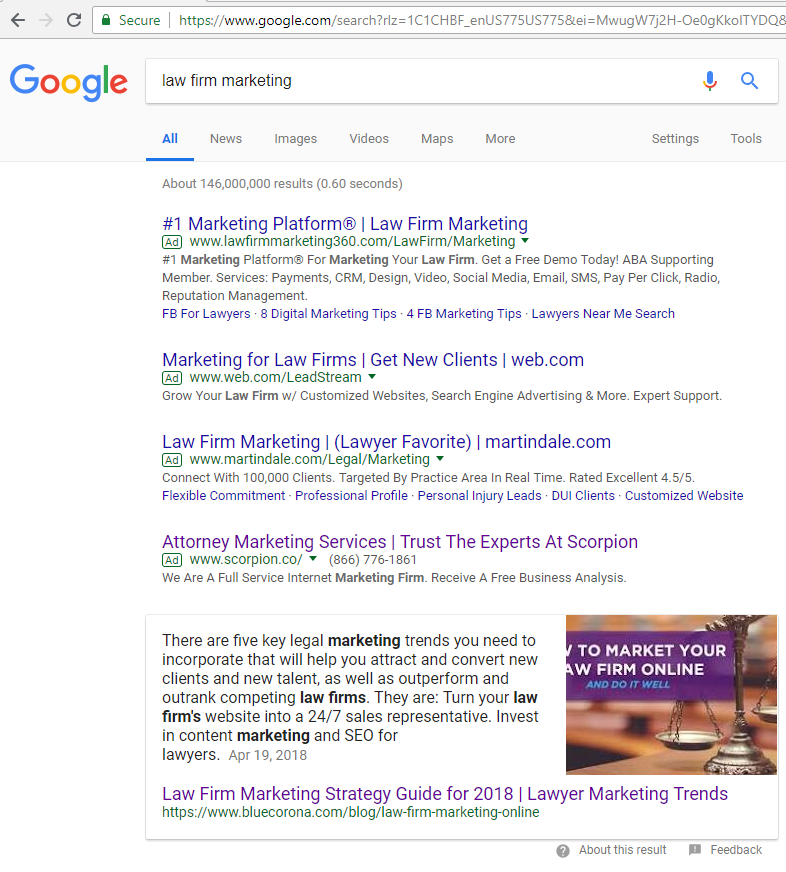
After the paid ads, you find other businesses that offer law firm marketing services in the local pack and organic results.
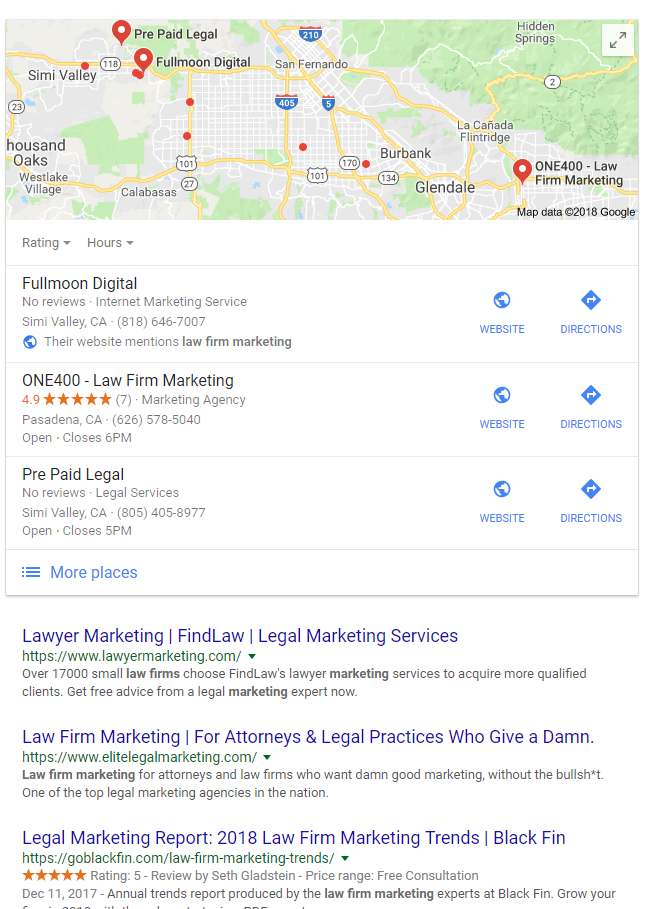
You’re going to put in work just trying to figure out who you should hire to do the work for you. But that’s expected. Right? Since you want to make sure whoever you end up hiring to manage your online advertising and lead generation has the chops to scale your law firm.
Here’s the kicker. There are many internet marketing agencies that claim to specialize in marketing for law firms, but in reality, does it really matter? I think it’s less relevant now than five to ten years ago.
Hear me out.
Contrary to traditional marketing wisdom where vertical expertise is lauded as masterful, but I venture to say there’s a shift in true skill sets for digital marketers.
It’s more important for marketers and marketing agencies to have skill sets in a wide variety of marketing software, tools, and analytics know-how to drive results.
Truthfully, who gives a crap if I don’t know what a statute of repose or statute of limitations is.
As a client, would you rather have your law firm marketing agency understand the law or be a ninja at keyword research and audience development and lead generation. I’ll take a guess and say the latter is your preference.
While there is no single law firm marketing plan for a legal practice, there are specific mistakes to avoid. And, this is what I’m writing about in this article.
Here are top mistakes law firms make when hiring marketing agencies
#1: Having inexperienced project managers
Managing a smooth workflow and keeping tasks on time is pivotal to any successful marketing campaign.
You can create the most targeted audience, the best Google Ads structure, the greatest looking Facebook image ad — and still fail miserably because your project manager is unable to bring it across the finish line.
I’ve seen this happen many times.
When marketing agencies hire incompetent project managers, you suffer as a result of their lack of understanding of lead generation, marketing software, and search platforms.
I’m not saying that digital project managers must understand every facet of internet marketing — nobody does. But there should be a basic understanding of the core and critical components that go into a search and social advertising campaign.
Like what?
Here are a few things that marketing project managers have said to me; and I almost fell off my chair:
- How do I give you access to our Facebook Business Manager?
- How do I set up a conversion pixel for Google Ads?
- What is the difference between phrase and exact match in Google Ads?
- How do I create a Facebook Ad Account?
When hiring a marketing company for your law firm, make sure you speak to your future project manager. Ask them a few questions about the platform you’ll be advertising on — usually Google or Facebook.
These are basic things that you must know in our age of digital transformation. How can marketing companies claim to be experts in their industry when their project managers in the front lines can barely understand the fundamentals of advertising?
If you’re talking to a potential agency you want to hire, and the project manager tells you “I’ll find out for you” or “I’m not sure, it’s not my area of expertise” too many times, it could indicate a huge knowledge gap.
Avoid this mistake with proper due diligence
The challenge with hiring an agency is that you cannot properly vet their abilities when you don’t know what to look for, or what might be a red flag.
You owe it to your business and team to ask the right questions before making any marketing hiring decision.
It’s also important that you learn the basics of marketing before interviewing any potential agency.
The last thing you want to do is be uninformed and get oversold or pitched on services that you don’t need or that won’t be effective for you.
Collaborate with your agency to develop your own marketing plan, and then have the agency execute.
Don’t let them dictate the entire strategy because they will never care about your business as much as you do, and unfortunately they may not always have your best interests in mind.
#2: Focusing too much on vanity metrics failing to see the bigger picture
Marketers have a tendency to focus on feel-good metrics. If you run a Facebook ad campaign and get a ton of likes, don’t get too excited until you check your engagement metrics like comments, leads, and sales.
Another metric that agencies tend to gravitate toward is impressions.
Impressions is the number of times your ad is shown in search results. But that doesn’t mean a thing if that ad didn’t get a click through.
I’ve talked to many clients who seem to be sold the visibility pitch.
They tell me that the previous law firm marketing agency told them that high impressions and low click-through rate is OK because their brand was seen by a lot of eyeballs. That’s when I go into my “OMG!” moment.
If your internet marketing agency doesn’t focus their discussion around these KPIs, then you have reason to be concerned.
Remember, as a law firm, your practice relies entirely on new and high value clients.
The KPIs that should be discussed are:
- # of new leads – there are two kinds of leads; marketing qualified leads (MQL) or sales qualified leads (SQL). As a law firm, your focus should be on the SQL – these are people “raising their hands” who need your help. They do so by either filing out a form to contact you or submitting their information for a free consult.
- Conversion Rate – this is the amount of people taking a desired action over the total visits to your website. For example, if 1,000 people visited your website today and 15 of them filled out a form for a free consultation, then your lead form conversion rate would be 15/1000 = 1.5%. Depending on how well your landing page performs, you should expect 5% – 20% conversion rate for a reasonably well optimized landing page.
- Cost per lead (CPL) – how much advertising dollars are you paying for each lead. Knowing your conversion rate is only part of the puzzle. You need to know how much you’re paying for each visitor that filled out your form. Let’s say you spend $5,000 in online advertising. Your cost per lead is calculated by taking the total spent divided by the leads you received. That means each lead costs you $333.
- Closing Rate – calculate what your true costs per paying client is important to make sure you’re profitable. Your closing rate is a percent of your leads. If you are closing your leads at 30% over the phone after your free consultation, that equals to 4-5 clients. So, your true cost per client is your total ad spend divided by paying clients. In this case you’re spending $1,000 to acquire a new client.
- Return on Investment (ROI) – this is calculated by the total revenue you generate from your case. If you charge $7,000 per client, then your return on investment (without calculating variable costs), would be 7X.
When you’re working with a marketing agency, make sure you are calculating the metrics that matter to your business’ bottom line.
#3: Do not have a complete understanding of your audience
It’s easy to talk about audience targeting.
Everybody is selling their services based on creating audiences, targeting demographics, and customer segmentation.
First of all, it doesn’t take a specialized law firm marketing agency to figure out how to build an audience — whether it’s on Google or Facebook or LinkedIn.
Building an audience in social or search engines is a skill any marketer worth their salt can execute — as long as they know what your customer profiles look like.
Specialized agencies might hate me for this, but it really doesn’t matter as much anymore now. We’re in a era of digital implementation — where a true digital marketer is expected to have a solid grasp of advertising platforms, especially major ones like Facebook and Google.
Let’s be honest. Law firm clients are lucrative business for marketing agencies.
Most lawyers work with a high retainer and the return on investment is justifiable. Internet marketing agencies understand this and aggressively go after law firms to offer their marketing services.
Reality is that some law firm marketing agencies don’t have in-house expertise to navigate Facebook’s targeting and audience segmentation features.
There’s a misconception that just because a marketing company is ranking in Google search when you type in “law firm marketing” or “legal marketing agency,” means they’re experts in driving leads for lawyers.
Anybody can launch a website these days and buy Google Ads and target law firm keywords. The barrier to entry is very low.
This is not what you, as a law firm, want to hear. But it’s the dead honest truth. Again, anyone can claim to specialize in law firm marketing. But not every law firm marketing agency have the expertise to build your right audience.
#4: Outsourcing your marketing to another outsourced agency
The internet marketing business is no different than many B2B businesses.
Everyone outsources to another outsourced company and subcontractors — it’s a saturated market.
What do I mean by that?
Let’s play out this scenario.
Your law firm decides to hire an internet marketing agency to handle your Google Ads and Facebook Ads campaign. You sign the contract and off they go.
What you may not be aware of is behind the scene, the agency you hired is outsourcing your Google Ads and Facebook Ads to other agencies to do the work. And that agency may subcontract parts of your campaign like ad copy, banner designs, and reporting to someone else.

At this point, you probably feel like your account is part of a multi-level marketing pyramid — in a sense it is.
Have you ever wondered why sometimes your account manager have no idea what is going on to your campaign on your weekly call?
It’s difficult for any law firm to realize if their account is managed through this incestuous outsourcing love triangle. Agencies have practically perfected the art of outsourcing.
This is where I have to clarify a misconception. I’m not saying outsourcing is bad. Fullmoon Digital is an agency that relies on our clients outsourcing their marketing work to us and even being the agency of record for many of our clients.
But what you need to be mindful of is how far the outsourcing can go.
Here’s an industry secret. Or maybe it’s just something most people rather not talk about.
Everyone outsources. Some just do it better than others.
#5: Neglecting customer review strategy
When was the last time you looked up customer reviews while on business or personal travel.
I do it all the time when visiting a new city with my family.
While they’re not always accurate, it’s the next best thing to just taking a chance and walking into a random restaurant without consult. Reviews have existed since the beginning of time — albeit in different forms.
Every day, we rely on reviews on help make decisions — for purchases, what to eat, where to go on vacation, what software to purchase, what hotel to stay at, and much more. Reviews have become so integrated into our lives that we don’t even realize how much we base our actions on positive or negative feedback.
So, why are reviews important?
Online reviews are so important to businesses because they ultimately increase your sales by giving customers the transparent information they need to make the decision to purchase your service or product. People are always more likely to buy when it’s recommended by other customers.
People searching for legal representation is no different. In fact, because of the sensitive nature of legal matters, it is even more important to find the highest recommended and reviewed law firm to hire.
If your clients are looking for “workers comp lawyers” in your area, they’ll likely click on one of the Google Ads.
But it doesn’t stop there. Nobody will hire the first lawyer they come across. Just like you don’t buy the first car you test drive.
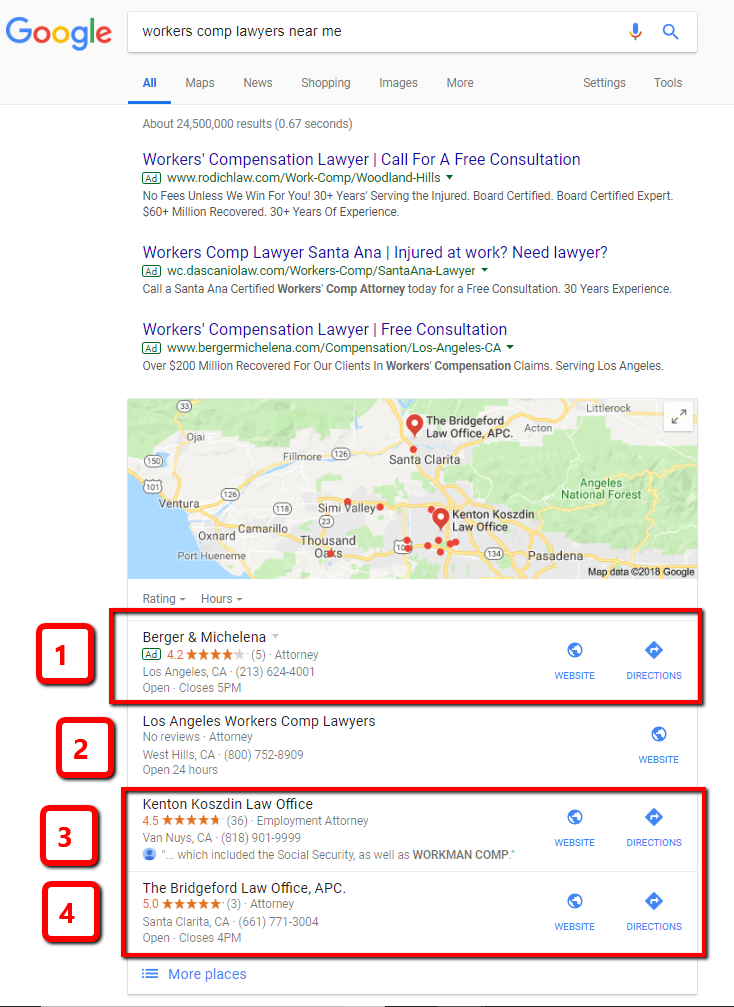
Just a little further down the search results in Google, there are local listings that feature law offices near you — typically within a reasonable radius of your location.
Imagine this.
I’m a hard working marketer. I stay late to finish my work and never complained about any projects. However, I did not receive fair compensation for my work with my employer for whatever reason.
I search in Google for a worker comp lawyer to represent my case.
In the screenshot above, past the Google Ads, there are four local law offices for “workers comp lawyers near me.”
One of out four do not have reviews. And only one of the three have over 30+ reviews. Because I want to find the best lawyer to help me, I will click on the website icon for Kenton Koszdin Law Office first. As opposed to Google Ads, where I would have clicked on the first ad, in this local pack I clicked on the website with the most reviews regardless of their order of position.
Having a review strategy for your law firm can make the difference between more clients every month. What law firm do you think your clients will click on when they need to find the best lawyer? The sites with low star ratings or no reviews, or will they click on your website because you’re going to have an excellent review strategy to get 5-star reviews.
#6: Failing to create your Avvo profile
So you have an amazing looking website that is packed with information, client testimonials, and services you offer.
Your landing page is designed to perfect after countless rounds of testing. And it’s converting at a healthy conversion rate. Leads are flowing into your CRM and everybody is happy. The work is done. Right?
Far from done. There’s one awesome resource that your law firm must tap into so you can double-down on your online presence.
Avvo.com.
According to Wikipedia,
Avvo.com is an online marketplace for legal services, that provides lawyer referrals and access to a database of legal information consisting primarily of previously answered questions. Lawyer profiles may include client reviews, disciplinary actions, peer endorsements, and lawyer-submitted legal guides.
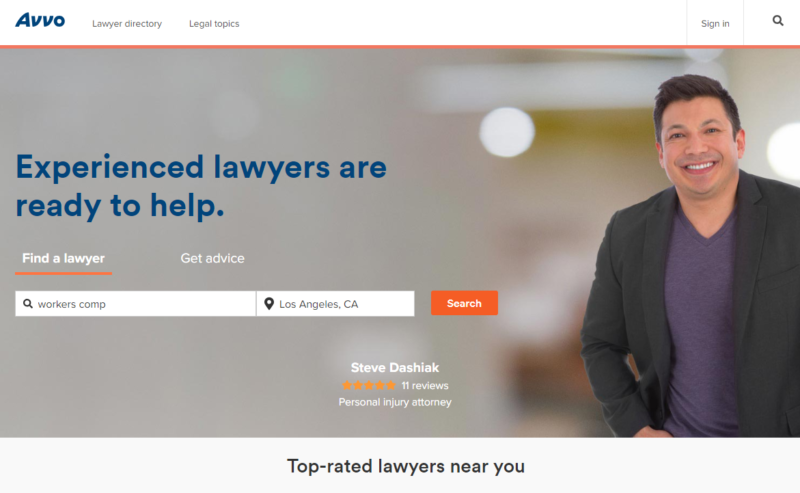
This is probably one of the most important profile you can create besides having a great looking converting website.
Staying with our workers comp example:
Using SEMRush.com, there’s an estimated 12,000 searches per month for workers comp lawyers.
Base on simple calculations, 12,000 x 20% would get any website ranking in position #1 about 2,400 unique visitors.
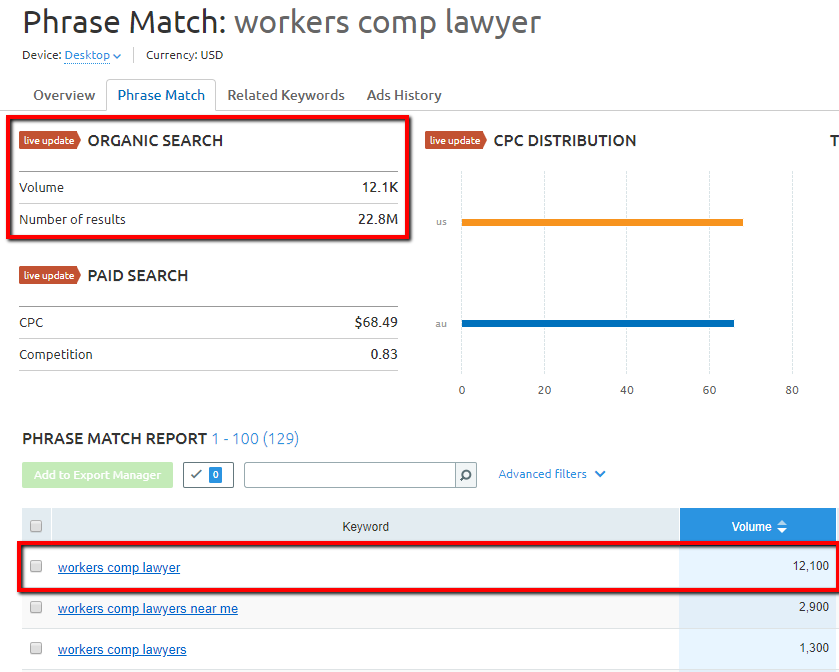
So why is creating a profile on Avvo.com really valuable? Under the paid search table, you’ll see that the estimated cost per click (CPC) for workers comp lawyers is a whopping $68 per click. That’s expensive even for the richest law firm in town.
That can cost you anywhere from $400,000 to $800,000 (12,000 * $68) per month in advertising budget, if you are considering getting the lions share of the clicks. For most law firms, that advertising budget is prohibitive.
Getting your law firm to rank for “workers comp lawyers” in SEO will take a long time; the amount of content, links, and optimization could take months or years of consistent SEO work.
A under-utilized strategy is to leverage a resource website like Avvo.com that has already achieved organic rankings for cases and clients your law firm is looking for. The added benefit is companies like Avvo.com have a healthy Google advertising budget and bid on keywords relevant to your firm, so you don’t have to.
Remember we talked about the importance of reviews in #5?
The next common search your clients will type in after searching for lawyers near them, is reviews.
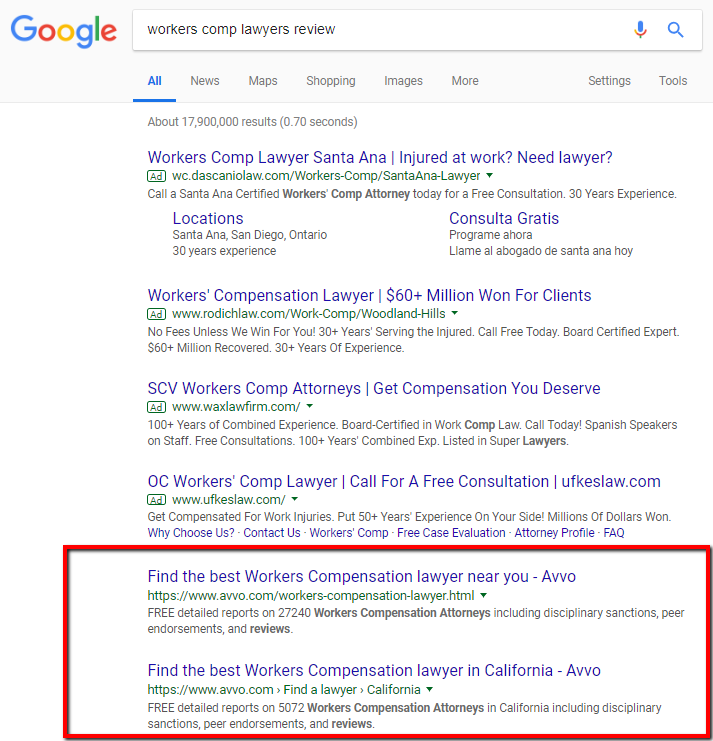
Look at which website is ranked #1 and #2 in Google results. Avvo.com is a well optimized directory for lawyers that they enjoy a wide coverage of lawyer-related case types.
According to IgniteVisibility, first position in Google search results can get a click-through rate as high as 20% — that’s huge.
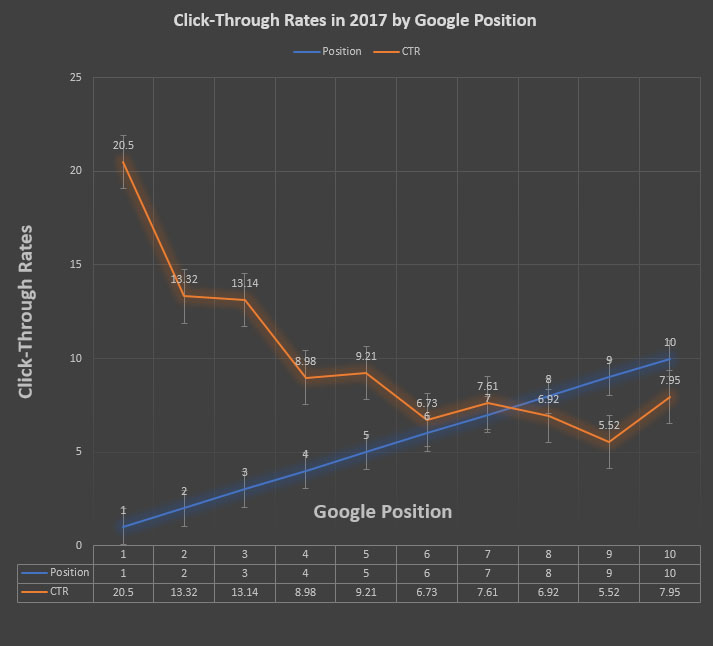
The California workers compensation lawyer page as a list of every lawyer in the Avvo directory clients can contact to hire.
Each profile also has reviews, links to websites, and clients can send private messages to any lawyer they wish to talk to about their case.
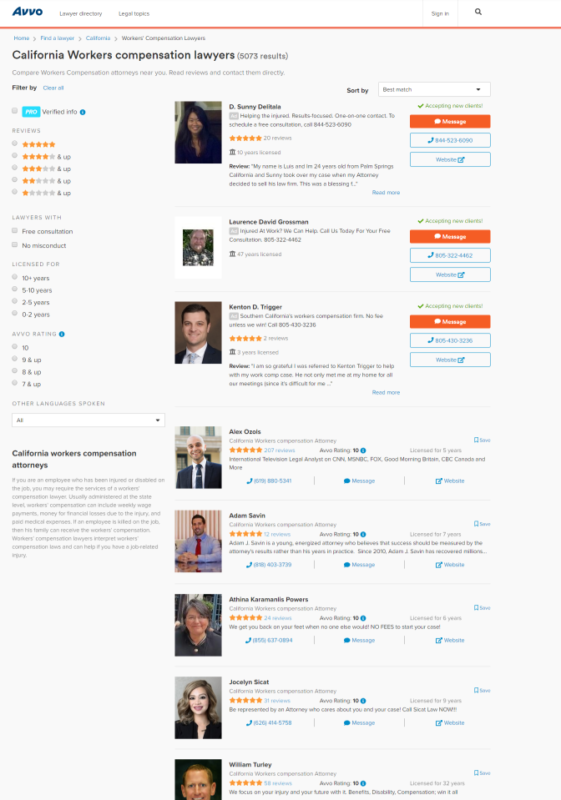
Without access to Avvo.com’s website analytics and page performance, I’m willing to estimate that the website gets somewhere between 500 to 1,000 visits to the workers comp page for California lawyers in my example above.
Create your lawyer profile here.
#7: Being impatient to see results; causing knee-jerk reactions
As an internet marketing agency, we work with a wide variety of clients.
Every project we work on is focused first on consistent and continuous improvements every month.
That doesn’t stop a handful of clients from expecting immediate results. There’s no agency I’m aware of that can produce immediate results for any brand — and if you happen to stumble on one such agency, I advise caution.

Whether you’re managing your own advertising or outsourcing your lead generation, you must not react before giving the changes you make enough time to gather significant data to analyze. What do I mean?
If you’re a law firm with a modest advertising budget, pay very close attention to this.
First, the average Google Ads CPC for law firms we work is around $5 per click. This is the cost of every user click in Google’s search, not display CPMs.
So, a $2,000 per month Google Ads budget will get you approximately 400 clicks or 20 clicks per weekday, assuming your campaigns don’t run on weekends.
In the grand scheme of things, 20 clicks per day is not enough for anyone to draw conclusions from.
But you’re going to say “Derek, $2,000 per month is a lot of money,” and yes it is for any business. But it’s more expensive in the long run if you don’t make decisions based on data rather than your opinion.
Do I have an example? Of course I do.
We used to have a client who logs in many times a day to review their Google Ads campaigns, make changes to budgets, costs per clicks, and toggling ad groups on/off.
This disrupted the optimization our team did and interfered with sustainable campaign management.
On several occasions, this client would revert all the campaign adjustments within hours; just because conversions dipped by a few percent.
Small percentage movements is significant for businesses with large daily search and transnational volume.
Moderate size law firms that averages five leads per day should not panic with small performance shifts. Allow the campaign optimization sufficient time to take effect you can collect the information you need to make data-driven decisions.
#8: Hiring the wrong internet marketing agency
Most lawyers don’t have the desire or the time to become an expert in marketing. But that’s OK!
It’s prudent to hire an agency who has a track record of delivering good results or hire a digital marketer in-house to run your law firm’s campaigns.
This is why law firms are either hesitant to work with an agency or take a long time to find one they can trust.
Nothing worth having comes easy.
― Theodore Roosevelt
It goes without saying that hiring the wrong agency or staff will be disastrous for business.
Don’t be misled by marketing agencies, and end up overpaying or being sold unnecessary services. This is one of the most common and costly marketing mistakes made by lawyers.
Lawyers who contact me say these two things about their current agency experience.
They are either stuck in a long-term contract or they’re not getting the level of service promised by their agency.
Any agency worth their salt will partner with you on a month-to-month term. Why? Because there will be no reason for you to leave when they get you results beyond your expectation.
As a business, you should be able to cancel the contract within a reasonable amount of time if you’re not satisfied with the service or results.
#9: Only focusing on the bottom funnel and ignoring the full-funnel strategy
By now, you’ve probably heard of TOFU, MOFU, and BOFU.
So that we’re on the same page, I’m not referring to the curd made from mashed soybeans, used chiefly in Asian and vegetarian cooking.
TOFU in this case stands for Top of Funnel, MoFu for Middle of Funnel, and BoFu for Bottom of Funnel.
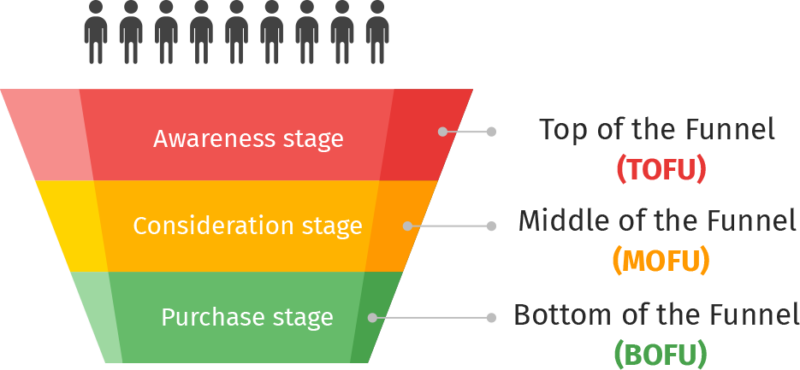
Each of the TOFU, MOFU, and BOFU coincides with your clients decision journey of engagement; from awareness, consideration to decision or purchase.
Most law firms focus all their effort on the BOFU part of the funnel. As a result, marketing agencies are conditioned to start building landing pages and launch ad campaigns to drive traffic directly to the lead capture.
Everybody is happy when leads are flowing into the inbox and new clients are signing up. But at some point, you will start to wonder why your leads are thinning out even with all the advertising you’re doing.
That’s because your competitor focused on the entire customer journey — from top, middle to bottom — creating a well-oiled functional marketing funnel that continuously brings in new visitors to their website.
Here’s the kicker. As a law firm, you are a brand in your community. Your reputation rests on the name of your law firm and what your business stand for.
This goes back to Step #0 of our article on creating a social media marketing strategy, where defining your why or purpose is the foundation of your brand.
From my experience, after 18 years in the digital space, agencies are notorious for hiring fresh graduates as account manager or campaign account executives. There’s a lot of inexperience in agencies who are trying to quickly scale their business.
This is not something you can prevent — just something to be aware of when you hire your marketing agency.
#10: Targeting the right keywords to increase your lead quality
Lawyers are very specific on the types of cases they handle.
Every law firm is focused on specific area of the law, and truthfully, they couldn’t care less about anything else except what they are experts in.
There is no other way to spin this. Lawyers want clients who are 100% match. But not every agency understand the nuance in the specificity of this requirement.
In talking to lawyers, many of them jump from agency to agency because of this specific reason — marketing agencies are getting leads that are not qualified. This is caused primarily by poor targeting of keywords and careless keyword strategy.
Unlike Facebook Ads where you can bid on interest, demographic, location, and other audience segmentation, Google Ads has similar segmentation capabilities and the additional ability for you to show your ads to based on specific keywords people are searching for.
You can tell if your marketing agency is targeting the wrong keywords and audience easily. How? They are driving you a healthy amount of leads each month, but the close rate is abysmal. Your true indicator of how well online advertising is working for you is by looking at how your ratio of Clients Retained / SQLs.
Here are few tips to make sure you are targeting the right keywords:
- Include synonyms of the keywords such as “workers comp attorney,” “workers comp lawyer,” “workers comp attorneys,” “workers compensation lawyers.”
- Stay away from broad match in Google Ads, unless you have a meticulous negative keyword list.
- Make sure the contents of the page your are sending clicks to match the keywords you are bidding on.
#11: Not tracking leads to conversion to closing properly
Marketing is not free no matter what people may tell you. From SEO and blogging to paid media and social marketing; everything cost money and time.
When you are acquiring new clients, you’re doing everything you can to convert them from leads to retained clients.
But conversion tracking can be complex.
It’s not as cut-and-dry like most people think.
For law firms, you generate leads through free consultations. Those are considered marketing leads but do not generate a return on investment for you. Your bank account doesn’t increase when someone signs up for a consultation.
Free consultation leads don’t tell the whole story.
This is one of the most easily avoidable law firm marketing mistakes, but I’ve seen it happen time and time again, and it creates a significant barrier to growth. Getting leads flowing into your inbox is exciting — everyone celebrates and moves on. Right? Not so fast.
It all starts with the leads your website generates to the retained client value for you to calculate your return on investment.
If you are trying to get consultation leads that don’t have a dollar amount to tie back to, you can set up a basic equation to give them value.
(Average Closed Lead Value X Rate of Lead Close) = Per Lead Value
Let’s say your average closed lead value is $5,000 per retained client.
Rate of lead close equals to the total of retained clients divided by total leads generated. If you generated 1,000 leads and retained 10 as clients, then your rate of lead close is 1% or 10/1000.
Therefore your per lead value equals to $50; meaning the most you should be paying for a free consultation lead through all your marketing strategies combined.
If you know how much your retained case value is, then you can tie it back directly to the marketing spend to calculate your return on investment.
While you can get more sophisticated with a complete CRM solution; this simple equation will give you insight into how much a lead is worth in your business, making it easier to tie back ROI to your conversions.
Some other mistakes to avoid:
- You’re not using video in your marketing efforts.
- Not having a Google Plus business page.
- Failing to engage an audience on social media.
- Not adapting your strategy with trends.
- Not thinking about the potential client’s experience.
- Random stock photos that mean nothing on your home page.
- Don’t confuse your tactic vs. strategy.
- Targeting specific location in Google Ads and Facebook Ads.
- Address the pain points of your clients.
Conclusion
When you’ve decided to launch a marketing campaign, what’s your focus?
If it’s not setting up your conversion tracking, you’re making a big mistake.
Your law firm can only grow if you are tracking the marketing efforts that are contributing to your growth in leads and retained clients.
If your bank account isn’t growing, then no amount of free consultation leads matter.
Tracking your return on investment is how well your online campaign is doing.
Always remember this. Clicks don’t tell you that. Neither do leads, opt-ins, or consultations. Only revenue does.



